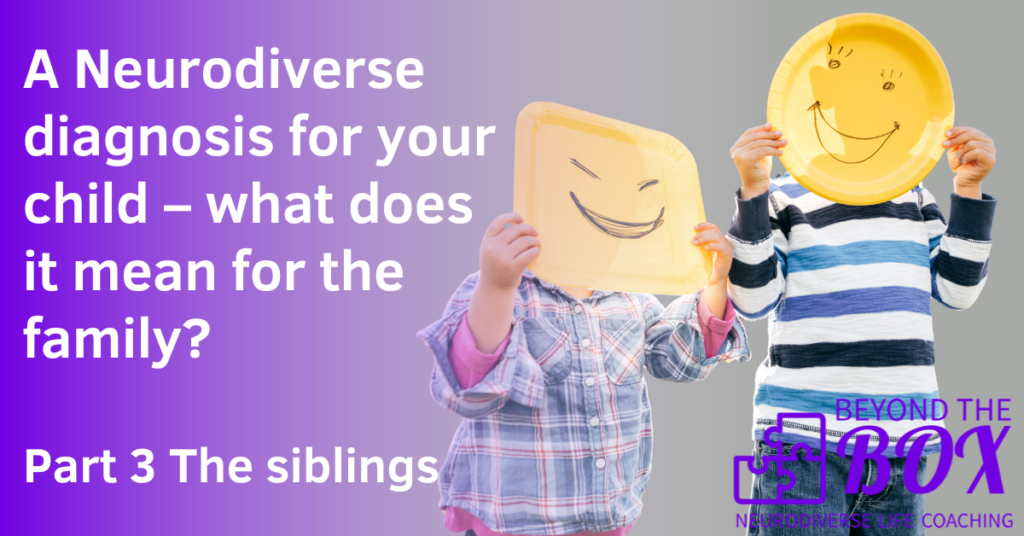Before I continue, I want to say that this 5-minute read has been difficult for me to write because it brings up all the emotions we experienced when our child received the diagnosis we pushed for. It still shakes your world in a way you never knew. You will pick yourself up, you will learn, and you will adapt. Give yourself time, space, and be gentle with yourself. You will not get everything right the first time or even the second!
There are three perspectives to understand here:
- Parents supporting the child
- The child receiving the diagnosis
- The siblings of the family
Family life & the wider family
Each of these groups will experience the diagnosis differently.
The Siblings
Yes, the siblings are affected by this diagnosis, whether they are older or younger. Our other child is older, so she had the capacity to understand a bit more. When we started to understand our youngest and communicate with her differently, we changed the way boundaries were put in place. Our oldest noticed this and complained; this made us stop and think she had a point. We did approach discipline and boundary-setting differently with each child.
At that point, we realized we would have to explain to our oldest why we are taking that approach. We have had many conversations and/or shouting matches about this. Explain to the sibling what has happened and explain about how the world of your diagnosed child works.
We would say our older child understands, and she does agree with that statement. However, she is still a teenager and a sibling, so she still feels the need to get up to mischief. Sometimes if she is feeling that way, she will do something to deflect and distract us from telling her off. She will start to needle our younger child which, in the early days, would result in a meltdown, forcing us to give the child in meltdown the attention.
By the time we had gotten through the meltdown, our older daughter’s mischief had been forgotten about. We realized what was happening, so through discussion with our younger child, we agreed that should the shouting occur (because it’s the shouting that sends her into a meltdown, not what we are shouting about), then she is to go to her safe place, her bedroom, giving us the space to deal with our older child.
That took us about 2 years to get to that point with many failed solutions. This is not to say that our older child is always doing this because she is not. A sibling can easily get left behind in all of the diagnoses. You have to remember just because they are children does not mean that they cannot observe and process. As a parent, you are there to help them understand the processing and explain things. They might not like it or want to be bothered with everything, but they will understand the “why” of things.
The Sibling Bond
We are lucky that they have an amazing bond, and we regularly refer to them as “the girls,” one unit. From discussions with our oldest, she agreed that the time we took to explain, a lot, to her about Autism helped her to better understand her sister. She also said that when she was going through a really horrible phase of puberty, she could pick an argument with Casper (our cat). During this period, she developed a very good understanding of how to upset her sister. I would definitely agree! That aside, they have an incredible bond and accept each other without question, although it’s not all plain sailing. They are teenagers!
A sibling is not there as an extra carer for your child; they are there to be a sister or brother, to play with each other, grow up with each other. Or as they are currently doing right now, with one in the hospital and one on a study day at home, including me on a WhatsApp group call, and doing their utmost to annoy me when I am supposed to be working. Now they are having a conversation about Gremlins!!
Siblings are the people who you can discuss random things with, have shared memories, want to kill at certain points in time, support when they need it. They do not have to explain anything to a sibling; they are accepted for how they are. For them, their relationship is a lifelong commitment without any questions, judgment, or explanation; it just is.

